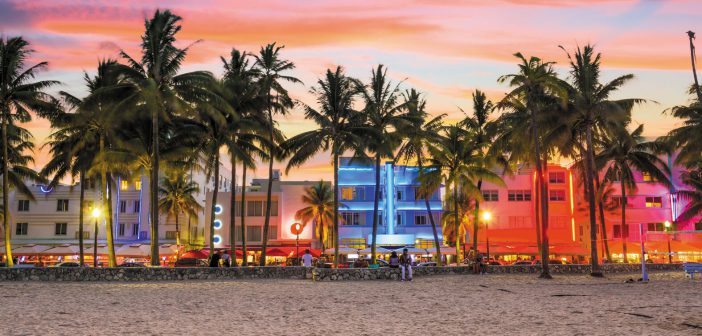More than the beach
by Asif Lakhani
Miami experienced a record-number of overnight visitors – 15.86 million – between January and December of 2017, according to the Greater Miami Convention & Visitors Bureau annual report. Early returns of the 2018 numbers showed a 3.1-percent increase of visitors for the first six months of 2018 compared to the same time period of 2017, according to the Miami Herald.
Each overnight visitor to Miami spent an average of $270.62 per day and $1,637.26 per trip, which led to “an estimated $25.97 billion in direct expenditures in Greater Miami and the Beaches,” the GMCVB report says. International visitors were responsible for 62 percent of total spending in 2017, according to the Bureau. Unsurprisingly, the overwhelming majority (86 percent) of visits to Miami in 2017 were for vacation and leisure purposes, but business visits did account for 7 percent of the total.
Despite the boom in business, Miami’s popularity as a vacation destination has caused some headaches for short-term renting platforms such as Airbnb. In December of 2018, the City of Miami won an appeals court decision that allowed the City of Miami to “punish hundreds of Airbnb hosts accused of illegally renting their homes on the site,” according to the Miami Herald. Airbnb responded by suing Miami Beach over the short-term rental restrictions in January 2019, the paper reported later.
The regulations for short-term rentals, which can be found on the Miami-Dade County website, state that such properties must be licensed by the state of Florida and registered with the Florida Department of Revenue for tax purposes. Another requirement is a Certificate of Use (CU) that costs just over $130 must be obtained and renewed annually.
Fortunately for visitors, there is no shortage of hotels in Miami. Options range from budget friendly to supremely luxurious. For example, the city is home to a Four Seasons, Ritz-Carlton, and Mandarin Oriental. A 140-room Waldorf Astoria is scheduled to open in downtown in 2021. The hotel will be the brand’s first in the Miami market. Towering just over 1,000 feet above Biscayne Bay, the building also will be one of the tallest hotel and residential buildings on the East Coast, according to the press release.
While the beach itself is enough to warrant a visit, there is much, much more to do when in South Beach. One of the most popular events each year is Ultra Music Festival, which usually takes place in late March and showcases some of the best artists and DJs in electronic dance music. UMF has taken place in Miami for two decades, but as of May 2019, its exact location for 2020 is undetermined. The festival took place in downtown Miami from 2001 to 2018, then was moved to another part of the city, Virginia Key, in 2019 after downtown residents’ complaints of noise and traffic problems were finally heard. In a follow-up survey for fans after this year’s festival, more than 20,000 of them said the Virginia Key experience was unsatisfactory. As a result, festival organizers declared in an open letter that they have decided to willingly terminate their license with the City of Miami and are looking for a new South Florida venue to hold the 2020 festival. The festival had a $79 million impact on Miami’s local economy, according to the South Florida Business Journal.
Miami is home to three major professional sports teams and one of the storied college football programs in history, the University of Miami, so fall is a great time to visit. Other Miami attractions include Little Havana, the Bayside Marketplace with over 150 shops and restaurants along the waterfront, the Art Deco Historic District, parks, museums, natural attractions such as the Everglades National Park, and much more.
Ultimately, Miami offers a totality of things that even most major cities can’t and leaves a lot more to be experienced once there. Culturally, it is a hub not only for South Florida but also for the U.S. Economically, it is a catalyst for tourism because of its natural scenery and also for its reputation as a nightlife institution and overall destination. Miami’s greatest downfall may be its susceptibility to natural disasters (specifically hurricanes), but the city has positioned itself as a top destination for tourism and leisure while still managing to stay relevant in a constantly changing world.



